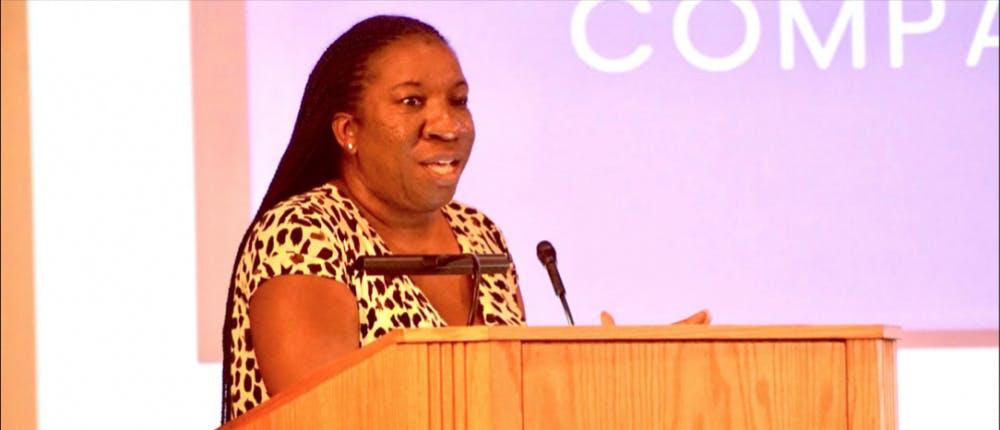By Camille Furst
Managing Editor
She began by listing off their names.
Jenny Lumet; Bobbie Phillips; Anthony Rapp; Katherine Brooks Harris; Lulu Garcia-Navarro; Vanessa Tyson; Jennifer Araoz; Jane Doe; John Doe.
In the room filled with hundreds of people, everyone was fully aware of their alleged perpetrators’ names. But only a few hands rose when asked if they were aware of these victims’.
“The names of these men we hear over and over and over again,” said Tarana Burke, the civil rights activist who founded the Me Too movement in 2006. “The names of these survivors, and really, the lives of these survivors, are inconsequential to most people … because the mainstream media doesn't have an interest in telling us, and we haven’t asked.”
Anti-Violence Initiatives and the department of women’s, gender, and sexuality studies hosted “Tarana Burke, Compassionate Advocacy,” where students, professors and local activists flooded into Kendall Hall on Sept. 23 to listen to Burke’s words.
Before the main event, Burke hosted a private session in the Biology Building lounge for those heavily involved in activism, including women’s gender, and sexuality majors and those involved with AVI. Burke answered questions about activism work and compassionate advocacy.

One of the main topics of conversation turned to self-care and the well-being of activists themselves. Burke mentioned that everyone on her team is a survivor — and while that makes the work more fulfilling, it can be an emotionally heavy line of work.
When it comes to having compassion for perpetrators, “it’s not easy,” she said. “It’s just possible.”
Zachary Gall (’13), the director at the Office of Violence Against Women Grant Project and one of the prevention education specialists at the College, found the private session to be the most illuminating. Having graduated from the College with degrees in English and psychology, he currently works on the professional staff of AVI. Gall’s work has been heavily concerned with social justice and victim support and advocacy.
“What ‘Me Too’ really did … (was) create a little discomfort,” Gall told The Signal. “Because we don’t change unless we’re uncomfortable. And so Me Too generated that discomfort of like, ‘wow, people are getting hurt in my community. Maybe I can do something about that.’”
However, during Burke’s main speech, she spoke of her work’s background. The idea came to her 20 years ago when she was writing on a legal pad on her living room floor. She said that she never expected to speak in front of an audience of people who wanted to listen.
During the Q&A portion of the event, Burke addressed questions about supporting victims, searching for community and finding “empowerment through empathy.” She emphasized the importance of treating sexual violence for what it is rather than concealing it behind closed doors.

Burke also questioned the audience on why if an act of physical violence were to occur, the whole community would be in uproar, but if the act was sexual violence, “we don’t see the same response.”
According to Burke, one of the factors in the manifestation of the Me Too movement was to bring awareness and give victims a chance to speak out, regardless of race, ethnicity or sexuality.
Nonetheless, her team continues to receive messages and emails asking about the effectiveness of the movement in terms of recent sexual assault cases regarding notable celebrities, including Jeffrey Epstein and Tony Robbins. Burke’s response is that the movement isn’t necessarily meant to cause a shift, but rather a stir.
“It’s at the stage for a shift, but that really depends on what you do next,” she said.
Salomine Ekambi, a sophomore public health major who attended the event, agreed with Burke’s sentiments.
“People typically shy away from topics that make them uncomfortable,” she said. “If we don’t talk about it, things will remain the same.”
For the future, Gall also agrees that more work still needs to be done.
“I think (the event) will help us remember to be responsive,” he said. “It’s going to remind us that … needs shift and things change, and we want to be adaptive to that.”
But the energy in the room shifted at the end of Burke’s presentation. Audience members were emotional and uplifted as she finished her speech.
“I shouldn't be making these speeches in five years,” she said. “I shouldn’t be the face of the Me Too movement in five years. I am praying every single day that one of you … will say, ‘you know what? Your idea was good, but this is better.’ So I’m asking you to join me. Let us heal together. Let’s heal ourselves, and let’s heal our communities. And if you are ready to do that, I can only leave you with these two words: me too.”







